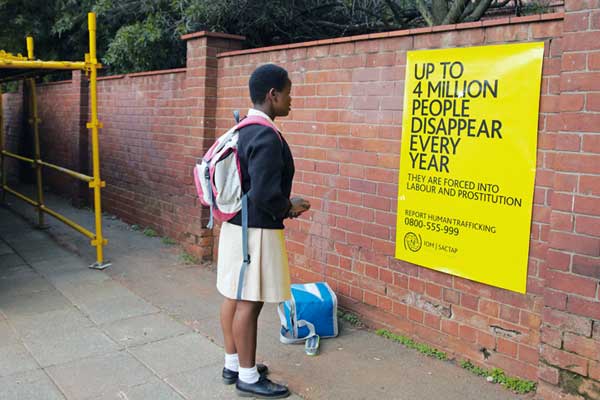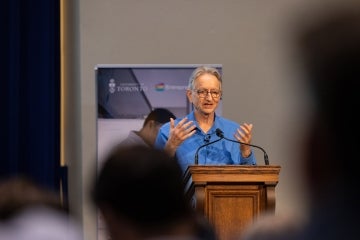
Human trafficking course arouses strong passions in undergrad students
Published: March 16, 2015
Michelle Chung and Alizee Zapparoli-Manzoni-Bodson are trying to speak at the same time, both eager to explain their group projects for Advanced Topics in Diaspora and Transnationalism (Human Trafficking, Migration and Human Rights).
Classmates Mariajose Lopez and Krystal Thomson lean in, waiting to talk about their own projects. Antonela Arhin, who teaches the course, interrupts with a comment about the nature of the group work.
“This is how we talk in class all the time,” Chung laughs. “Because of the nature of the topic – human trafficking – we feel very close to it. We feel very passionate.”
The fourth-year course is offered by U of T’s Centre for Diaspora and Transnational Studies. It’s the only one of its kind in Canada, says Arhin, adding that an increasingly volatile international climate makes the study of human trafficking especially important.
“In the class we look at all aspects of human trafficking – labour trafficking, sex trafficking, trafficking of children – we look at governments, and businesses and NGOs and the roles they play,” Arhin says.
 The students and their professor are talking to U of T News after participating in a roundtable on human trafficking, co-hosted by the CDTS and by the U.S. Consulate in Toronto. The roundtable provided an opportunity to share perspectives and experiences, says Arhin, and to identify areas of collaboration with representatives from U.S. and Canadian law enforcement, First Nations communities, non-governmental and governmental organizations, and service providers.
The students and their professor are talking to U of T News after participating in a roundtable on human trafficking, co-hosted by the CDTS and by the U.S. Consulate in Toronto. The roundtable provided an opportunity to share perspectives and experiences, says Arhin, and to identify areas of collaboration with representatives from U.S. and Canadian law enforcement, First Nations communities, non-governmental and governmental organizations, and service providers.
(Pictured in roundtable photo from left: Jim Dickmeyer, Consul General of the United States of America, Antonela Arhin and Cynthia Wang, Political and Economic Officer at the U.S. Consulate in Toronto.)
“It was a fantastic opportunity for my students to see how things are actually done on the ground,” Arhin says, “and to see the subtle negotiations between governments and NGOs.”
Thomson agrees that the roundtable was useful, although she was slightly disappointed that most of the discussion was about sex trafficking.
“Forced labour is here in Canada, but for some reason it’s ignored,” she says. “A few speakers tried to get that in, but the conversation was primarily about sex work.”
Forced labour is a subject of particular concern for Thomson, and it’s why she enrolled in the course. Her classmates’ reasons for taking the course vary: Chung was curious about the North Korean workers who were being hired at Toronto restaurants; Lopez wanted to learn more about prostitution; Zapparoli-Manzoni-Bodson, who did work last summer with Palestinian and Syrian refugees in Turkey, had been studying international relations but felt she wanted to learn about people, not countries.
“I’d known about this course for a while,” she recalls. “I wanted to take it in my third year but it was full so I had to wait until fourth year.” Lopez enrolled in the DTS program specifically to be able to take this course.
Like other fourth-year seminars, the trafficking course involves a lot of readings – four to six per week. Topics for the readings include children as commodities, organ trafficking and cyber trafficking, smuggling versus trafficking, trafficking for forced labour in global supply chains, and human trafficking for the purpose of sexual and labour exploitation.

(From left: Michelle Chung, Krystal Thomson, Antonela Arhin, Mariajose Lopez and Alizee Zapparoli-Manzoni-Bodson)
Arhin also brings in guest lecturers, including representatives from the U.S. Consulate and from local NGOs. She says that guests can add an extra dimension to the class.
“We had frontline service providers who have had direct experience with victims. They provided a fascinating narrative and brought first-hand experiences to my students, which was a real added value to the theoretical aspect that we cover in class.”
There’s also a group project. “We choose an issue that we want to resolve and then we propose a solution to it,” Chung says. Her own group looked at media representations of human trafficking. Other projects included how to bring traffickers to justice given the international nature of their activities, and the post-trafficking and settlement model for trafficking victims in Canada.
The exact scale of human trafficking is unknown. The U.S. State Department, which provides comprehensive reports and statistics each year, says it’s impossible to quantify the number of people affected, but that it affects the entire world – even Canada.
“Canada is a great country,” Thomas says, “but it has a lot of vulnerable populations, including victims of human trafficking. Indigenous populations are particularly vulnerable, along with people who come here to work through programs such as the Live-in Caregiver and the Temporary Foreign Worker programs.”
Chung, Lopez, Thomson and Zapparoli-Manzoni-Bodson are all in their fourth year and thinking about what they hope to do after graduation.
“I’ve applied for my master’s at a few schools, and my intent is to study Canadian-American relations. I’d love to intern with an NGO,” Thomson says.
Chung also plans to intern or volunteer, preferably with a community organization. Lopez has her sights set on working with the City of Toronto for a few years and then heading to grad school. Zapparoli-Manzoni-Bodson has applied to Oxford as well as U of T. This summer she hopes to go back to Turkey and possibly work on documentaries about refugees in that country.
But that’s in the future. Right now Arhin and her students are anxious to get back to the issues raised at this morning’s roundtable.
"What about corporate social responsibility?” Arhin asks. “What about the teenagers who make garments in Bangladesh?” And the passionate discussion continues.
Terry Lavender writes about global issues and international affairs for U of T News.



